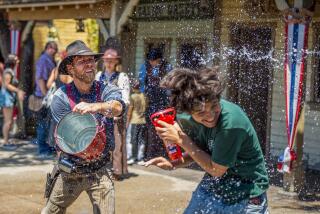Two Bit Circus will bring an indoor game-focused theme park to downtown Los Angeles
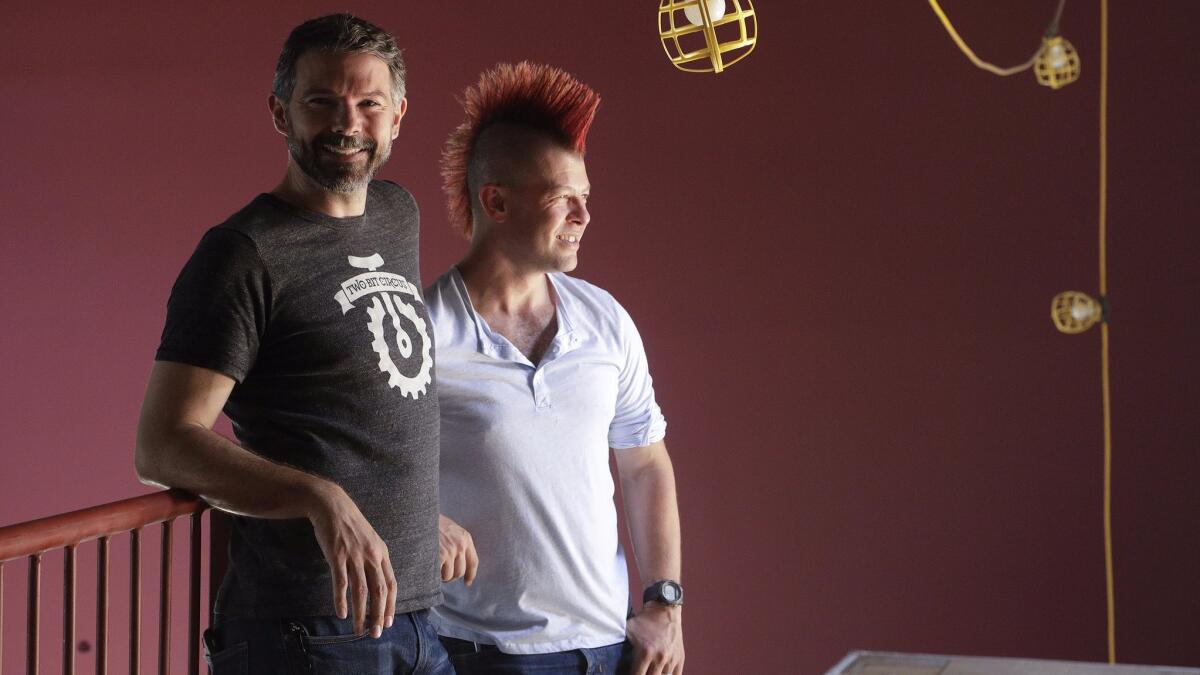
Ask the founders of Two Bit Circus just what it is they’re building inside a 50,000-square-foot space in downtown’s Arts District, and the answer will shift daily.
Consider Two Bit Circus a modern-day arcade, one based more on social interaction than individual play. Or maybe call it a live-action video game, one where attendees are not only players but also characters inside the story. But maybe it’s better to think of Two Bit Circus as the future of theme parks, a place where the attractions are rooted in theater and require the full-body participation of attendees.
Regardless of the definition, here’s what’s known. When Two Bit Circus officially opens — founders are targeting September — it will contain the bridge of a “Star Trek”-like starship, only here missions are dispensed via a disembodied brain. There will also be a full bar, but it’s quite possible your drink will be made by a robot, one that will likely flirt with you. There will be a restaurant — and place mats may or may not contain clues that will send diners off on a scavenger hunt to discover the make-believe history of the building. Oh, and the restaurant will be built around a train.
Ultimately, Two Bit Circus aims to bring a mix of technological and theatrical experiments to a converted warehouse within walking distance of well-known restaurants such as Church & State and Bestia. Two Bit is led by Brent Bushnell, a 39-year-old veteran of the event and game space as well as an engineer-turned-inventor who appeared on ABC’s “Extreme Makeover: Home Edition.” He also helped rock band OK Go score a viral video by having a hand in constructing a massive Rube Goldberg machine. With Two Bit Circus, he wants to redefine not only how we play but also how we socialize.
There will be large-scale heavily digitized midway-style games, carnival games, virtual reality stations, escape rooms and what Two Bit is describing as “story rooms” — 30- or so-minute narrative-driven adventures that will allow guests to, say, take control of a starship. On a recent visit to the still in-construction space, a story room that contained a mine shaft was also alluded to. Two Bit wasn’t ready to discuss the latter, stopping the tour instead inside the bridge of a ship that was called the Space Squad Infallible.
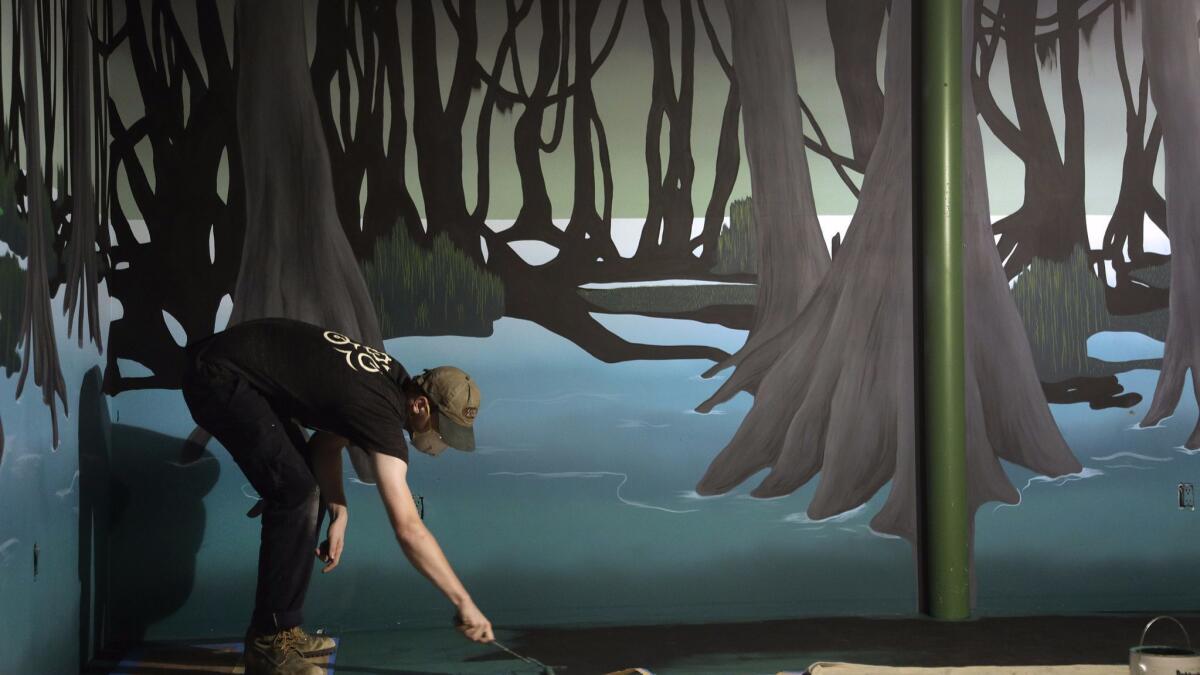
“Have you flown a starship before?” asked Eric Gradman, 37, Two Bit’s chief technology officer. “Every single console in this space works, and it is mission based. You’ll walk in here with a bunch of different people, and everyone will gravitate to their own console. Then the brain in the jar — she’s asleep right now — the disembodied brain in the jar will wake up and tell you your mission.”
Admission to Two Bit will be free, but games, escape rooms and stories will carry a yet-to-be-determined cost. Space Squad in Space, for instance, will feature numerous episodic-like missions that can be reserved in advance.
A sampling: “All of us — four to six people — need to collaborate to do lots of different episodes,” said Gradman. “The first one is to figure out how to turn on the ship and pilot out of a docking bay. Then once we’re out of the docking bay, can we return the ambassador home? Once we return the ambassador home, can we find the lost galaxy?”
Bushnell is calling Two Bit Circus a “micro-amusement park.” There are no rides, however, just lots of games, and none of the entertainment is passive — that is, never expect to sit and watch something.
Bushnell is counting on people coming to Two Bit ready to play.
“There’s a new awareness around the fact that play is awesome,” said Bushnell, the son of Atari founder Nolan Bushnell. “Everyone can play, no matter what age. The term ‘gamer’ ostracized a lot of people. Games started super simple. They were for everybody. ‘Pong’ has three instruction lines: Deposit quarter, ball will serve, avoid missing ball. Super simple.”
While games remained big business, they also got more complicated, requiring high-priced consoles or PCs with control schemes that suddenly involved a dozen or so buttons. “The reality is we’re all gamers,” said Bushnell. “Maybe you like chess or solitaire or football. It’s a question of what kind of game.”
There are antecedents for what Two Bit is attempting. Disney, for instance, tried an indoor interactive theme park with DisneyQuest, for which a Chicago location was short-lived and a Florida outpost closed last year. Star Trek: The Experience, a mix of theme park-like simulations and interactive theater, operated for about a decade in Las Vegas before it shuttered in 2008.
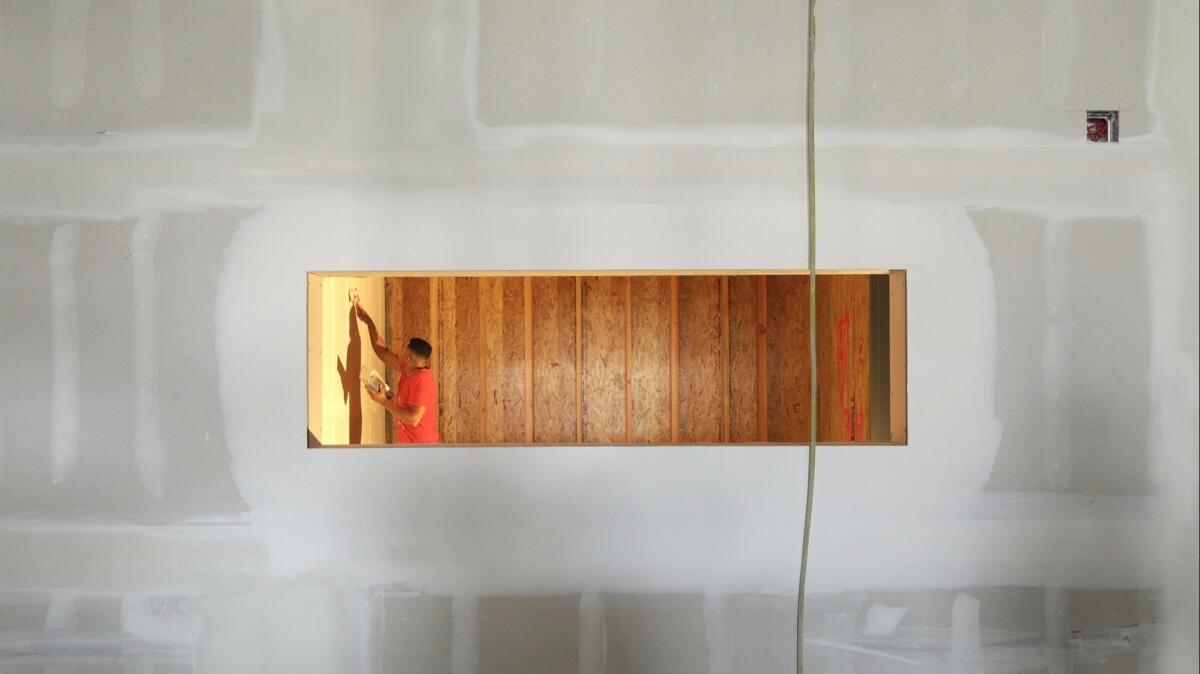
Bushnell praises both as ahead of their time. Arguing the moment is right for Two Bit, he points to an increase in experience-based events, be it the rise of immersive theater, pop-up restaurants themed to old TV shows or the host of brand-driven, game-like offerings that populated the weekend’s San Diego Comic-Con. To promote the upcoming show “Castle Rock,” Hulu, for instance, built an elaborate haunted house a few blocks from the convention center.
“We are social animals,” Bushnell said. “It’s about people getting together in public in a real way, and not a Facebook way.”
When one sets foot in Two Bit, which on most days will welcome an all-ages crowd before 9 p.m., immediately visible will be a host of different game experiences. Gradman said the space will be bright and welcoming, doing away with the sleek blacklight-focused look of many an old-fashioned arcade, and guests will likely encounter characters that somehow tie into the lore of the space.
“I don’t know if you know this, but this is the site of a 1928 circus that came through town and set up briefly,” said Gradman, before quickly adding that “none of that is true. But we are creating a history.”
Large-scale midway-style games will be on one end. These will be modeled after old-fashioned carnival games but rely heavily on modern technology. Nearly all will ask participants to get active. One has players maneuvering giant roller-balls to battle one another via a horizontal screen. Another is a tech-focused take on a balloon-pop game.
“The balloons are projected on the screen,” said Gradman. “Rather than picking up a physical dart, you reach into a giant ball pit and pick up a colored ball. You throw the ball at the screen. If you hit a balloon of the same color as the ball, that balloon will pop as well as all the adjacent balloons. It’s like a game you played on your phone. But we’ve made it giant and playable by four or five people at once. The ball pit moves up and done and balls are rolling all over the place. It’s visceral.”
Elsewhere, a wall of light-up buttons will have players getting physical in a sort of vertical Twister game. Another device looks a bit like a digital Skee-Ball machine, only the long, slim touch screens — Two Bit calls them Skidoo — are loaded with multiple original games. In one, said Gradman, “you can shoot balls of toast, bounding them off the wall and trying to avoid scissors.” And yes, he knows that “makes no sense.”
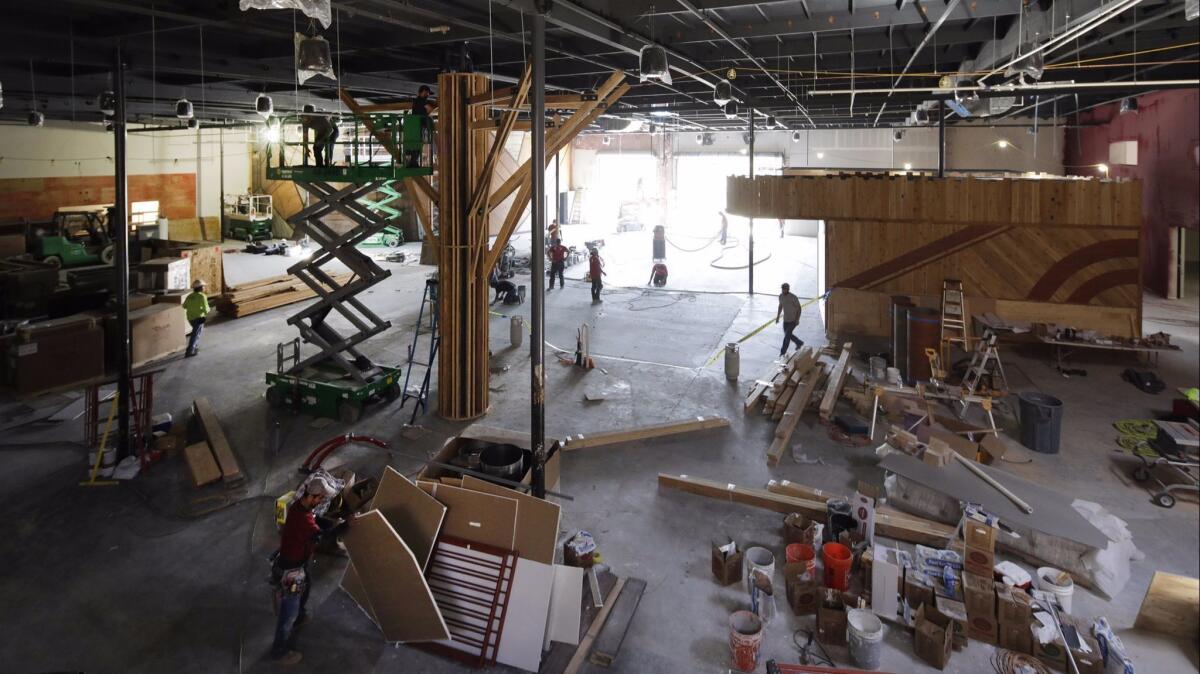
Many of the games are designed for five, six or more players. If arcades of yore were pitched at friends to come and play together, with specific groups rarely interacting with one another, Bushnell wants Two Bit to be a place where strangers will meet. Everything is designed to inspire conversation, even the bar seats that appear re-purposed from a Merry-Go-Round.
Another space inside Two Bit, Club 01, will seat 100 people on 46 touch screen-enabled tables dotted around a stage. Two Bit is developing a game around the art of wine tasting — in June, the hand-built tables were not yet finished, and wine stains were visible in the wood. There will also be more standard trivia events, and the screens, which look a bit like a retro sci-fi creation, may instruct neighbors to start talking to or quizzing one another.
“This is an important point,” said Bushnell, who talks about Two Bit as if he’s developing a social network. “Everything here is designed to bring people together. We understand people show up to a place like this alone expecting to meet people. One of the games in our arcade has six positions, and everyone is facing one another. You’re playing an arcade game in the round.
“People show up at events in groups of two or four, but not six. There will always be someone meeting a new person. You go in and have a pitched battle of capture the flag on this interactive surface, and then you can go have a drink together.”
Or maybe don’t play any games at all. The space has an underlying narrative tying everything together. Bushnell and Gradman insist there’s a reason there’s a single-eyed robot mixing drinks and circus-like performers walking the grounds. Clues will be hidden in the games, as well as the architecture.
“Our rabbit hole goes deep,” Bushnell said. “There is a lot of secret stuff that we’re not going to talk about.”
Follow me on Twitter: @toddmartens
More to Read
Only good movies
Get the Indie Focus newsletter, Mark Olsen's weekly guide to the world of cinema.
You may occasionally receive promotional content from the Los Angeles Times.


